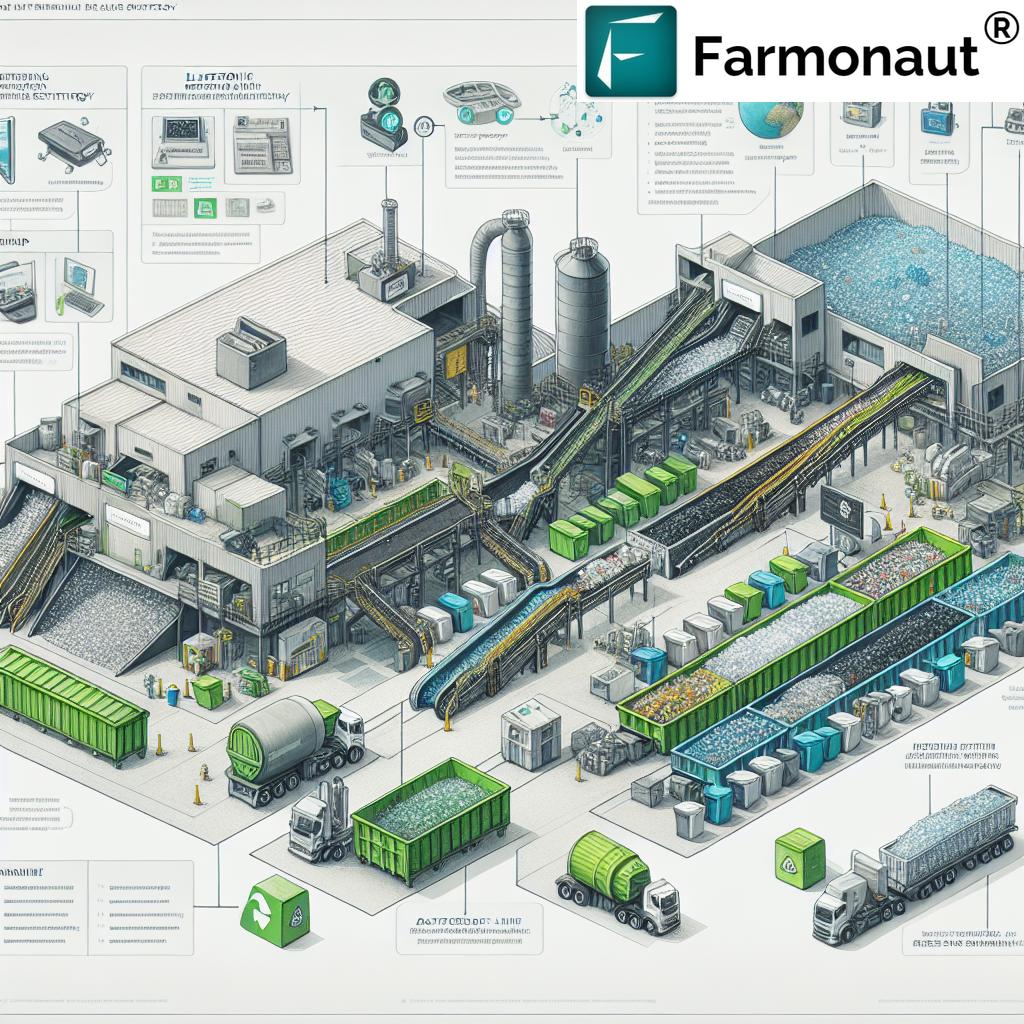Canada’s Federal Plastics Registry: 7 Key Business Reporting Rules
Introduction: The Dawn of a New Reporting Era for Plastics in Canada
Canada, guided by the Canadian Environmental Protection Act (CEPA), has ushered in a transformative era with the Federal Plastics Registry (FPR). As announced in Ottawa and finalized in April 2024, this sweeping environmental legislation Canada did not require new laws—only government resolve to act on an ambitious zero plastic waste strategy. Our collective mission? To revolutionize how businesses across the country account for every gram of plastic, from production through to its end-of-life management.
In this comprehensive article, we’ll break down the new plastic waste reporting requirements that now define business operations in manufacturing, agriculture, retail, construction, and beyond. You’ll discover key rules, compliance steps, subcategory risks, and how integrated digital solutions—like those we at Farmonaut deliver—help you thrive amid rising regulatory complexity. Whether you’re a plastic manufacturer, a retailer handling packaged goods, an agricultural business deploying plastic sheets or gear, or a construction firm with composite materials, understanding the Canada Federal Plastics Registry requirements is vital to your business’s reputation, sustainability, and bottom line.
Backdrop: Environmental Legislation and Canada’s Zero Plastic Waste Strategy
In Ottawa’s urgent push toward a zero plastic waste agenda, the federal government issued a notice of intent on December 30, 2023, regarding the FPR. This registry was formalized under the 1999 Canadian Environmental Protection Act—demonstrating that new plastic waste tracking could happen within existing environmental legislative frameworks. By April 20, 2024, the final rules were set, covering the breadth of Canadian industries where plastics touch—sometimes centrally, often incidentally.
Canada’s zero plastic waste strategy aims to eliminate plastic waste by 2030. Ottawa’s approach is comprehensive and evidence-driven, seeking “meaningful and standardized data, from across the country, on the flow of plastic from production to end-of-life management.” This national push directly links to global environmental commitments—decarbonization, circularity, and protection of land and water.
The new plastic waste reporting requirements form the core of Canada’s leap towards a truly circular economy. Their reach can only be understood by examining both who is affected and how. Let’s dig into those details.
Canada’s Federal Plastics Registry: What You Need To Know
The Federal Plastics Registry Canada introduces standardized reporting, compelling annual disclosure from a vast range of business operations. Each year, companies must file quantitative reports on the following activities:
- Manufacture of new plastics
- Import of plastics and plastic products
- Putting plastics on the Canadian market
- Plastics collected post-consumer or post-industrial
- Amounts diverted, reused, repaired, remanufactured, refurbished
- Plastics recycled, converted into chemicals, composted, incinerated, or sent to landfill
The scope includes all phases of a plastic’s journey—production, distribution, use, and end-of-life management—placing the onus on businesses to track and report plastic flows in their supply chain, directly fostering more robust plastic recycling and diversion.
Who Must Report? The Breadth of Businesses and Product Subcategories Affected
One of the most profound changes to plastic waste reporting requirements is the expansion of who is considered liable for filing. It’s not only resin makers, plastic product manufacturers, and large service providers—due to the pervasiveness of plastics, the rules directly reach:
- Retailers – from supermarkets to convenience stores, due to plastic in packaging and consumer goods
- Agricultural Firms and Farmers – where plastic mulch, irrigation gear, and even seed bags come into play
- Construction Businesses – using plastic composites, insulation, piping, and material wraps
- Producers and Importers of electronic/electrical equipment, vehicles, tires, clothing, carpets, disposable items
- Fisheries and Agricultural Equipment Providers
In practice, any business entity placing plastics on the Canadian market—or whose products contain incidental plastic—is now potentially subject to FPR annual reporting. This regulatory breadth highlights the importance of strong tracking systems for even those businesses where plastic is not a core element.
With plastic present in almost every supply chain, private firms of all sizes must audit all materials flowing through their operations, regardless of whether they are manufacturers or only incidental handlers of plastics.
Examples of Affected Subcategories
- Plastic in electronic and electrical equipment: household appliances, computers, smartphones
- Tires and vehicles: automotive parts, trim, dashboard elements
- Construction materials: pipes, wiring insulation, vapor barriers, window/door casings, geomembranes
- Agricultural and fishing gear: mulch film, twine, nets, seed trays
- Plastic in clothing, carpets, and disposable consumer items
The net of accountability has never been wider. Next, let’s detail the seven essential reporting rules that your business is required to follow under the Federal Plastics Registry Canada—and why they matter.
The 7 Key Business Reporting Rules Under Canada’s Federal Plastics Registry
Compliance with the Canadian Environmental Protection Act and the FPR depends on meticulously following 7 new reporting rules—each rule is targeted at a slice of the lifecycle for managing plastics across the country. Here, we outline the essentials:
-
1. Annual Quantitative Reporting by Business Type
All affected businesses—including manufacturers, importers, service providers, retailers, farmers, construction firms—must disclose plastics handled, placed on the market, or processed within the previous calendar year. Reporting frequency is annual, and each sector is obligated, regardless of scale.
-
2. Source and Type Identification
You must categorize plastics as resin, product type, and, crucially, by subcategory: e.g., agricultural film vs. vehicle interior part. This creates far more granular “plastic production and management data” for the government, furthering traceability across the value chain.
-
3. Full Lifecycle Reporting (Production to End-of-Life)
Businesses must now account for plastic materials through each phase: manufactured/imported, collected, diverted, reused, recycled, remanufactured, converted to chemicals, composted, incinerated, or sent to landfill. Detailed tracking of all movements is essential for compliance and performance measurement.
-
4. Product & Packaging Scope
The registry encompasses all plastics placed on the market—including those in electronic/electrical goods, vehicles, packaging, agricultural tools, construction materials, textiles, and disposable products. If plastic is part of your offering, it must be reported (even if not your business’s main product).
-
5. End-of-Life Fate Reporting
Specifically, you must report what happens to plastics at end of life: how much is collected and diverted (reused, recycled, composted) versus being composted, incinerated, or landfilled. This data supports Canada’s zero plastic waste strategy and performance metrics.
-
6. Submission of Data in Standardized Format
The FPR requires digital submission of all required information in specific, government-approved formats on the official FPR website. Adopting the right digital reporting or API-integrated solutions is essential for compliance.
-
7. Attestation and Record-Keeping Obligations
Each report must be certified as accurate and complete by an authorized officer. Businesses must also keep supporting records and documentation (for up to 5 years) in case of future audits or information requests.
Beyond regulatory compliance, these seven rules serve a broader environmental protection mission—delivering the transparency needed to measure Canada’s performance on its path to a zero plastic waste future.
Compliance Requirements Summary Table: Federal Plastics Registry Canada
| Rule Number/Name | Description of Requirement | Affected Business Types | Estimated Reporting Frequency | Potential Penalties for Non-Compliance | Example Data Submitted |
|---|---|---|---|---|---|
| 1. Annual Quantitative Reporting | Report total quantity of plastic manufactured, imported, or marketed. | Manufacturers, producers, importers, retailers, construction firms, farmers, service providers | Annually | Fines up to $1,000,000 per violation | Tonnes of plastic produced/imported |
| 2. Source and Type Identification | Detail plastic by resin, product type, subcategory. | All with plastics in product/packaging | Annually | Administrative penalties, reporting suspension | Resin code, product subcategory (e.g., vehicle interior, agricultural film) |
| 3. Full Lifecycle Reporting | Track plastics through all phases: made, sold, collected, diverted, disposed. | Manufacturers, importers, retailers, waste managers, agricultural businesses | Annually | Audit risk, escalating fines | Total collected, percentage recycled/composted/landfilled |
| 4. Product & Packaging Scope | Report any plastic in products placed on market, incidental or primary. | All sectors, including construction & agriculture | Annually | Product delisting, monetary penalties | Packaging weight and plastic type |
| 5. End-of-Life Fate Reporting | Report fate of plastics: reused, recycled, incinerated, landfilled, etc. | Manufacturers, waste handlers, retailers, conglomerates | Annually | Legal enforcement, public disclosure | Tonnage incinerated vs. composted vs. recycled |
| 6. Standardized Digital Submission | Use government-approved format via FPR website/API. | All businesses subject to regulation | Annually | Rejection of report, compliance investigation | Digital file upload, standardized spreadsheets |
| 7. Attestation & Record Keeping | Certified, fully documented, and retained for 5 years. | All reporting entities | Annually/On-Demand (for audits) | Increased regulatory scrutiny, potential liability | Signed attestation forms, backup documentation |
How to Stay Compliant: Step-by-Step Reporting Guidance
Staying ahead of these plastic waste reporting requirements is a must for every Canadian business. Here’s how we recommend you approach FPR compliance:
- Audit Your Operations: Conduct a thorough review of all touchpoints for plastics—including raw materials, packaging, and incidentals. This is especially vital for farmers, construction businesses, and retailers who may not see themselves as plastic-centric.
- Understand Your Reporting Category: Identify all subcategories of plastics you handle. The FPR’s breadth means reporting is required for every relevant product you market, even if plastic is a small component.
- Implement Digital Tracking: Set up an internal plastic tracking system or leverage external API-based solutions like Farmonaut’s satellite and API services for accurate data.
- Compile and Organize Data: Collect production, import, collection, reuse, recycling, and end-of-life data across your value chain. Be ready to document and defend submitted numbers.
- Submit Annually via FPR Website: Prepare your reports according to the government-mandated format and submit ahead of deadlines to avoid last-minute issues.
- Attestation and Record Retention: Have an officer sign off, and maintain full documentation for five years for regulatory reviews or audits.
Common Pitfalls to Avoid
- Overlooking incidental plastics in supply chain (e.g., wrapping, hidden parts, secondary packaging)
- Failing to differentiate subcategories (e.g., agricultural vs. construction grade plastics)
- Underestimating recordkeeping requirements—full traceability is now the standard, not the exception
With non-compliance penalties reaching up to $1 million per violation, it is imperative that every business, regardless of sector, takes its FPR obligations seriously.
Plastic Production and Management Data: Fueling Performance Measurement and a Circular Economy
The purpose of collecting plastic production and management data extends far beyond box-ticking for government. Data is the lifeblood of environmental legislation in Canada—used to:
- Measure the performance of the zero plastic waste strategy
- Reveal sectoral progress and identify high-risk or high-waste areas
- Inform future policy and environmental protection mandates
- Benchmark and promote new standards for plastic recycling and diversion
According to the FPR’s website, robust data collection “will keep plastics in the economy and out of the environment”—defining the new gold standard for transparency and stewardship. As we transition from a linear to a circular economy, transferable compliance frameworks will inform everything from carbon footprint tracking (Farmonaut offers a real-time carbon monitoring tool) to advanced end-of-life fate analytics.
For agricultural businesses in particular, aligning with FPR rules can complement sustainability reporting and help demonstrate environmental leadership—especially when leveraging a platform that provides carbon footprinting benefits.
Integrating Technology: Farmonaut’s Role in Sustainable Agriculture Compliance
As regulatory reporting complexity grows, digital solutions like those provided by Farmonaut become invaluable for Canadian agricultural businesses and those indirectly affected by plastic tracking mandates. Our platform delivers a powerful suite of agricultural technology solutions, including:
- Satellite-Based Crop Health Monitoring – for real-time, hectare-level measurement of land use, crop type, and input application
- Blockchain-Based Product Traceability – enabling blockchain-based traceability from farm to market, ensuring all products using or packaged with plastics are fully documented and transparent
- Fleet and Resource Management Tools – streamlining logistics for agricultural plastic waste collection and transportation, which can be reported for FPR compliance via our fleet management services
- Carbon Footprinting Solutions – offering insights into agricultural carbon output and supporting sustainability reporting demands invoked by evolving environmental legislation Canada
Farmonaut’s API access (API | Developer Docs) enables seamless integration of satellite-based monitoring and reporting, supporting compliance for both large-scale agribusinesses and smaller farmers.
Support, Resources, and Farmonaut Solutions for Regulatory Compliance
Our platform is designed for quick onboarding and scalability, empowering users to turn compliance burdens into impactful data-driven opportunities. Whether you require satellite-based acreage analysis, year-over-year plastic waste tracking, or AI-driven agricultural advice, Farmonaut can deliver:
- Instant access through Android and iOS apps, alongside our web and browser-based platform
- Real-time dashboard visualizations for monitoring crop health, soil moisture, and resource use
- Secure, blockchain-based product journey tracking for transparency and audit preparation
- Integration with your compliance team’s digital workflow—even for incidental plastic tracking
For organizations involved in crop insurance or financing, our satellite verification technology can streamline policy issuance and reduce fraud risk—see our crop loan and insurance services for more information.
To explore scalable, precision farm management or regulatory ready reporting tools, try our Large Scale Farm Management dashboard or plantation advisory app.
FAQs: Federal Plastics Registry Canada
Any company or business entity that manufactures, imports, markets, collects, diverts, recycles, or handles plastics within Canada—including those in the agricultural, construction, retail, electronics, vehicle, and textiles sectors—may be required to report. This includes businesses where plastics are only incidental to their main operation.
There is no “de minimis” (minimal use) exemption. If your product contains plastics, or if any part of your supply chain involves plastics that end up on the Canadian market, you are subject to reporting requirements.
Submissions must be made via the official Federal Plastics Registry website in digital, standardized format. Businesses may also use API integrations for automated or large-scale data submissions.
All documentation and backup records supporting your annual FPR submission must be retained for at least 5 years and provided upon request should governmental audits arise.
Fines can reach up to $1,000,000 per violation, in addition to legal enforcement actions and potential public disclosures of non-compliance.
Farmonaut offers advanced tracking, monitoring, and reporting tools—including satellite imagery, AI-driven analysis, and blockchain traceability—to help businesses in agriculture and related industries manage plastic data collection and prepare accurate regulatory submissions.
For in-depth integration and technical support, explore the Farmonaut API developer docs for step-by-step instructions on using our platform for compliance and sustainability.
Conclusion: Preparing Your Business for a Sustainable Future
Canada’s Federal Plastics Registry under the Canadian Environmental Protection Act heralds a new era of environmental legislation Canada and plastic waste management. The breadth and depth of new plastic waste reporting requirements demand immediate and sustained action from businesses in every sector—manufacturers, producers, importers, retailers, agricultural businesses, and construction firms alike.
By understanding and proactively complying with these seven key reporting rules, Canadian businesses are not just avoiding costly penalties but also joining the national movement for sustainability, performance, and world-class environmental stewardship. Integrated technological platforms like Farmonaut—delivering satellite monitoring, blockchain traceability, real-time resource management, and carbon benchmarking—are essential allies as we all work to eliminate plastic waste and shape a truly circular economy.
Are you ready to stay one step ahead of compliance, build trust with stakeholders, and contribute to a more sustainable Canadian—and global—future?








